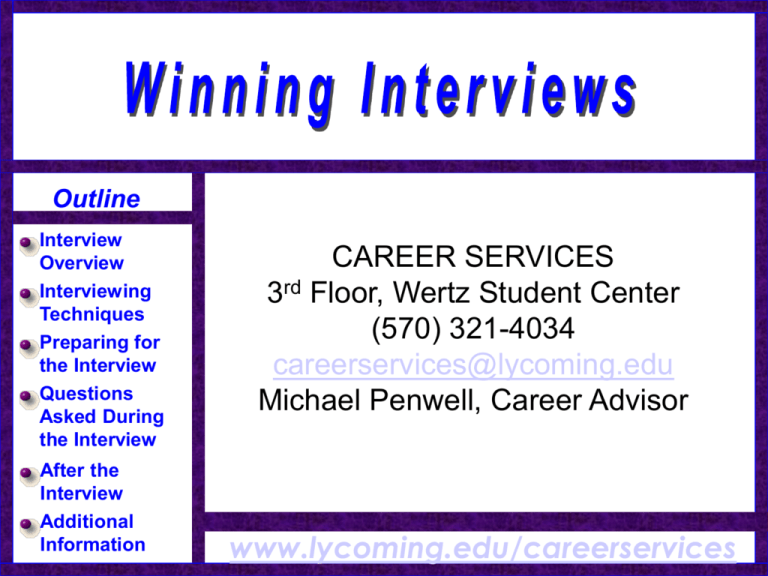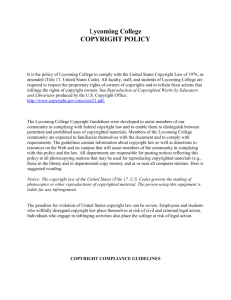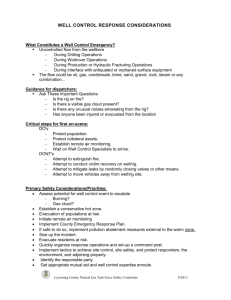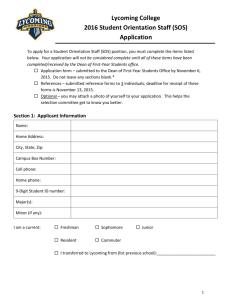Interview Techniques
advertisement

Outline Interview Overview Interviewing Techniques Preparing for the Interview Questions Asked During the Interview After the Interview Additional Information CAREER SERVICES 3rd Floor, Wertz Student Center (570) 321-4034 careerservices@lycoming.edu Michael Penwell, Career Advisor www.lycoming.edu/careerservices Distinguish Yourself by: OBJECTIVE: To take yourself one step closer to generating the job offer Treating the interview as the only opportunity you will have to speak with the employer Obtaining inside information about the organization through research and your networking contacts (alumni, faculty, friends, etc.) www.lycoming.edu/careerservices Characteristics of Strong Candidates: Employers want people who: Look like they can handle the job Appear to be dependable workers •Relevant Work Experience •Academics •Analytical Skills •Technical Skills •Interpersonal Skills •Communication Skills •Motivation •Teamwork Convince them they have enough job-related skills/training to handle the job or can learn quickly •Leadership www.lycoming.edu/careerservices Research indicates that first impressions are critical to the ultimate decision to hire Attitude is everything! Interview Techniques Basic Format Structured v. Unstructured Behavior-Based Interviews Telephone Interviews On-Site Interviews • Demonstrate a positive attitude • Show excellence • Strive to do your best www.lycoming.edu/careerservices The Basic Format Introductory Stage Put your best foot forward Review of your background, interests, and abilities Discussion of employer’s potential opportunities and how you fit or match Conclusion- points are clarified and questions are asked/answered (i.e., a two-way exchange) www.lycoming.edu/careerservices Structured v. Unstructured Some interviewers mix the styles Structured- Interviewer asks a prescribed set of questions, seeking relatively brief answers Unstructured- Interviewer asks more open-ended questions to prod the candidate to give longer responses and reveal as much as possible www.lycoming.edu/careerservices Behavioral Interviews Looking for common skill sets (communication, leadership, problem solving, etc…) Built on the belief that past performance is the best predictor of future success Rather than ask how you would perform, you are asked how you did perform- “Tell me about a time when…” or “Give me an example of…” www.lycoming.edu/careerservices Telephone Interviews Take a surprise call in stride Beware of over-familiarity Trial Run for the face-to-face interview Allow the company representative to do most of the talking Speak directly into the telephone Keep your answers brief, but factual Take notes Have a few work-related questions prepared Don’t hesitate to ask for clarification Stand up, look into a mirror, and have materials available for you to access www.lycoming.edu/careerservices On-Site Interviews How to prepare Remember: The hiring decision is based not just on your qualifications, but the employer’s total impression of you What to bring Be able to respond to questions, ask your own questions and observe Don’t forget your table manners Salary discussion (know your worth!) Take notes/record your impressions www.lycoming.edu/careerservices Dressing for the Successful Interview: % Men % Conservative 2 piece suit, white dress shirt, simple silk tie & Women & Conservative 2 piece suit, white or pastel blouse or shirt Dress to suit your interviewer and the position for which you are interviewing Dress one level above the position for which you are interviewing Dress conservatively, and wear fresh, neat, and pressed clothing Avoid excessive make-up, jewelry, and perfume/cologne www.lycoming.edu/careerservices What to pay attention to when researching an employer: Where You Can Acquire Information on the Employer: • Structure of the organization Employer literature/companycontrolled materials • Products that are produced • Services that are provided • Financial status of the organization • The organization’s competitors Internet Resources Company information/resources available at Career Services Informational interviews • The reputation of the organization • Recent accomplishments/changes www.lycoming.edu/careerservices Practice Practice Practice Practice Practice Practice Practice Practice Practice Practice Practice Practice Practice Practice Practice Practice Practice Practice Practice Practice Practice Practice Practice Practice Practice Practice Practice Practice Practice Practice Practice Practice Practice Practice Practice Practice Practice Practice Practice Practice Practice Practice Practice Practice Practice Practice Practice Practice Practice Practice Practice Practice Practice Practice Practice Practice Practice Practice Practice Practice Practice Practice Practice Practice Practice Practice Practice Practice Practice Practice Practice Practice Practice Practice Practice Practice Practice Practice Practice Practice Practice Practice Practice Practice Practice Practice Practice Practice Practice Practice Practice Practice Practice Practice Practice Practice Practice Practice Practice Practice Practice Practice Practice Practice Practice Practice Practice Practice Practice Practice Practice Practice Practice Practice Practice Practice Practice Practice Practice Practice Utilize resources such as Mock Interviews Types of Skills to Explain Technical/Professional - skills related to performing within a job, task or class, acquired by reading, training or education Functional - skills related to people, information or things that are transferable from one field or occupation to another Personal - skills that represent your style of working- often called personal traits or self-management skills www.lycoming.edu/careerservices Top key points in Nonverbal Communication Eye Contact: single most important type Facial Expressions: smile often, but naturally Posture: stand tall, sit tall, be tall Gestures: limit the amount used Space: be aware of your personal space and that of the interviewer Body language: should be open and confident Avoid nervous actions and defensiveness www.lycoming.edu/careerservices Use S.T.A.R. Statements by describing: How to Prepare for a Behavioral Interview • the Task you were faced with Review your resume line-by-line. Your goal is to recall situations that show favorable behaviors or action and prepare short descriptions for each situation • the Action you took to deal with the situation Use appropriate examples to backup your statements • the Situation or challenge undertaken • the Result of your work Use this time to relate stories from your personal and professional experiences! Let them get to know you a little! www.lycoming.edu/careerservices Sample Questions Tell me about a time when you: See Career Services Preparing for An Interview Guide for additional information Worked effectively under pressure Handled a difficult situation with a co-worker Had to make an important decision with limited facts Were forced to make an unpopular decision www.lycoming.edu/careerservices Illegal/Improper Questions Examples of Illegal/Improper Questions National Origin • What is considered to be illegal/improper? • What should you do if you are asked illegal/improper questions? Religion Marital Status Race Disabilities Citizenship www.lycoming.edu/careerservices Prepare for the Problem Question • Balance negatives with positives • Don’t dwell on the negatives Examples What are your weaknesses? You have a low GPA. Why? I don’t see any related work experience here. Why? Why haven’t you been involved in extracurricular activities? What would you like to be doing five years from now? What would your references say about you? www.lycoming.edu/careerservices A Few Examples of Questions Commonly Asked by Employer Tell me about yourself. Remember, preparedness is key! Why did you choose your particular college major? What personal characteristics do you think are necessary for success in this field? Why are you interested in my organization? www.lycoming.edu/careerservices Examples of Questions Commonly Asked by Candidate What would my immediate responsibilities be if I am hired? Resist the temptation to discuss salary What qualifications are most important to a person’s advancement within your company/organization? What do you consider to be the biggest challenge(s) I would face if I am hired? www.lycoming.edu/careerservices After the Interview Call and thank them that day Thank you letters should be sent within 24 hours of the interview if possible Write follow-up/thank you letters immediately • If possible hand deliver or email the thank you letter the next day When to call employers Ask for the job www.lycoming.edu/careerservices TOP 10 SKILLS EMPLOYERS SEEK •Communication skills (verbal and written) •Honesty/integrity •Teamwork skills (works well with others) •Strong work ethic •Analytical skills •Flexibility/adaptability •Interpersonal skills (relates well to others) •Motivation/Initiative •Computer skills •Detail-oriented Source: NACE‘s Job Outlook 2006 Survey www.lycoming.edu/careerservices For additional information go to: • www.lycoming.edu/careerservices • Click on ‘For Students’ GOOD LUCK! • Click ‘Resources’ • Scroll to ‘Interview Preparation’ www.lycoming.edu/careerservices




